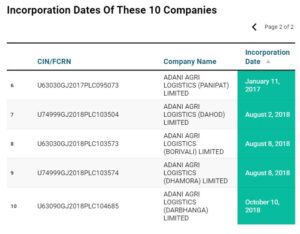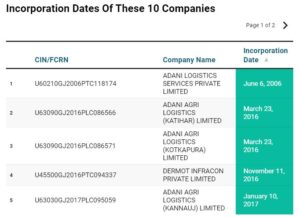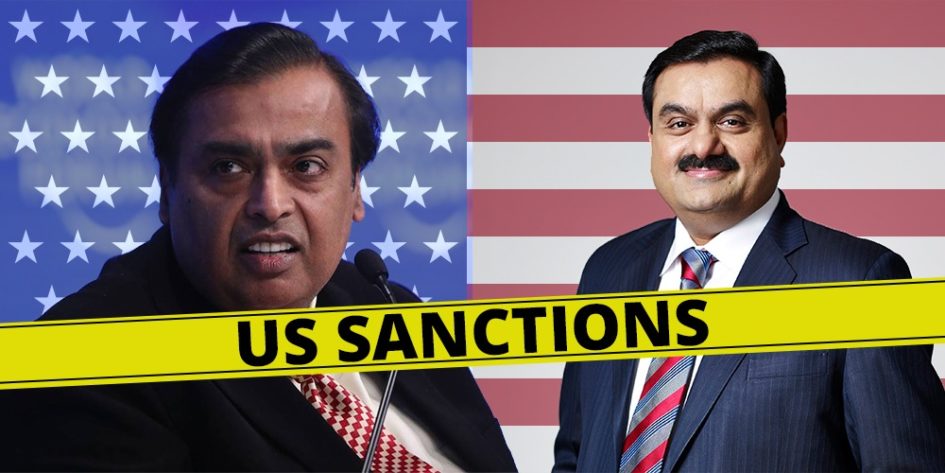ByScott JohnsonJanuary 14, 2021
World: The quarrel between the Indian government and Farmers have been inconclusive after repeated talks; even farmers ruled out the apex court’s decision to constitute a four-member committee. Why is the government backing the laws as people affected by them are on the roads for about two months? The truth behind it lies in the top two corporate houses of India.
According to several international media reports and reliable sources, it was revealed that Adani Agri Logistics Ltd (Owned by Gautam Adani, India’s second-richest person) had incorporated a number of agriculture-oriented companies since 2019. It is surprising how Adani and Ambani were well aware of the farm laws before those were tabled in the Indian Parliament. Nevertheless, the Adani group also constructed a silo with a capacity of 200,000 metric tons in the Moga district of Punjab, which is currently providing a food storage facility to the Food Corporation of India (FCI). Lining up another high capacity silo, the Adani group has purchased land in Faridkot district to construct it for a high volume storage facility.


Similarly, India’s richest person, Mukesh Ambani, openly denounced his involvement in the agriculture sector. In fact, after making such a statement, Ambani owned Reliance Retail Limited officially stated to purchase over 1,000 quintals of Sona Masoori Paddy from farmers in Raichur of Karnataka state for price more than MSP (Minimum Support Price), which is considered as a deliberate action to lure farmers into the trap.
There is no doubt that new farm reforms were tabled to support ‘Corporates,’ not farmers. There were significant violations of global Human Rights during the agitations of protesting farmers’ march towards national capital, which is termed as “Rebellion against tyranny and oppression.”
BJP Chief Minister Manohar Lal Khattar directed Haryana police to use force and used water cannons, tear gas to halt the protest from reaching the national capital, which violates article 3, 5, and 13 of the Human Rights declaration (Article 3 – Right to life, liberty and the security of person. Article 5 – Degrading Treatment. Article 13 – Right to Freedom of Movement).-
Indian Media made a third violation of the Human Rights declaration by labeling farmers as terrorists. Article 12 of the declaration states that “No one shall be subjected to arbitrary interference with his privacy, family, home or correspondence, nor to attack upon his honor and reputation.” Another primary concern in this protest is the passing of 60 people who died during agitation at the New Delhi border area due to excessively cold weather.
The Supreme court’s intervention in the matter has come up as a ray of hope. However, farmers claim that the apex Indian court has set up a committee consisting of biased people favoring these three farm laws that endanger these small farmers’ rights on their lands.
US Senior Lawyer and Political Analyst Lanny J. Davis has lately published an article on the current situation and the jeopardy that the Indian government has placed itself in favoring these farm laws, resulting in political damage, as he compared the situation with conservative UK PM Margaret Thatcher’s deregulation programme in the 1980s and how her own party members overthrew her in 1990. Lanny Davis, who served as Special Counsel to President Bill Clinton, is renowned for his writing for major concerns, whether those are national or international.
Being a popular name in US politics, Davis’ article might undoubtedly make significant positive development to pursue the US government to take actions to tackle the Indian farmers’ crisis.
He tweeted: “This issue of small farmers suffering throughout India is now a worldwide human rights concern – and should has been addressed by media worldwide – in the US, Western Europe, Australia. See this article. And soon to be published my own op Ed on the subject.”
Apart from this, an official source in President-Elect Joe-Biden’s administration revealed on condition of anonymity indicated a possibility of US sanctions on the two corporates known to be behind these laws- Ambani and the Adani families under the Magnitsky Act.
The families in question would face the consequences of severe sanctions by the new United States government under the Magnitsky Act. Ambani and the Adani group could face Economic and Financial sanctions by the US, which would freeze these individuals’ assets, so they can’t access their money in foreign bank accounts.
Besides this, there are assumptions that United States President-Elect Joe Biden could also utilize “smart sanctions” that are designed only to punish a small number of personalities.
The Magnitsky Act is a US law that directs at human rights abusers and crooked, unethical officials worldwide.
The “three farm laws” are based on the future benefits that the Ambani and the Adani corporate businesses will receive. These three laws, namely- Produce Trade and Commerce (Promotion and Facilitation) Act, 2020, the Farmers (Empowerment and Protection) Agreement of Price Assurance and Farm Services Act, 2020, and the Essential Commodities (Amendment) Act, 2020, are being highly opposed by farming communities of Punjab and Harayana where APMC’s are still in progress.
Agricultural Produce Market Committee (APMC) is a selling board installed by state governments in India to guarantee that farmers are safeguarded from giant retailers’ exploitation.
The Indian government continues to ignore the matter, and Prime Minister Narendra Modi has not come up to share the grieving families who lost their members to the “farmers protest against the Modi government.”
The demonstrations on the borders of the Indian capital are like never seen before, at the protesting site- farmers can be seen distributing free food to the police officials who are guilty of thrashing the protestors by using water cannons, tear gases, and even sticks.
Some of the farmers who are over the ages of 80-year-old are protesting peacefully on the capital’s borders, and they are sleeping on the highway in tents. However, the treatment they have been receiving from the Modi government is exceptionally heart-wrenching.
Indian Prime Minister Narendra Modi is known to be extremely vocal on Twitter- but the silence in his tweets on the farmers’ issues has been receiving a lot of criticism from people.
The Indian government owns a significant number of media houses in the country, which are now facing a major boycott from the demonstrators. The farmer protest is now turning into a movement where these farmers have their own newspaper, “The Trolley Times,” that keeps these protestors aware of the happenings with “unbiased opinions.”
The Indian media’s attempts to denote these farmers are terrorists have also failed badly; the humanitarian work these protestors are doing on the demonstration site is exceptional- people from nearby slums are no longer starving as farmers have started community kitchens that are feeding thousands daily for free.
Canadian Prime Minister Justin Trudeau, United Nations Chairperson António Guterres have already lent their support to these demonstrations.

Leave a Reply